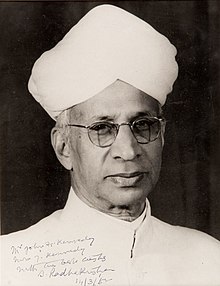
Back Sarvepalli Radhakrishnan Afrikaans سارفيبالي راذاكريشنان Arabic سارفيبالى راذاكريشنان ARZ সৰ্বেপল্লী ৰাধাকৃষ্ণণ Assamese Sarvepalli Radhakrishnan AST सर्वपल्ली राधाकृष्णन AWA Сарвепалі Радхакрышнан Byelorussian Сарвепали Радхакришнан Bulgarian सर्वपल्ली राधाकृष्णन Bihari সর্বপল্লী রাধাকৃষ্ণণ Bengali/Bangla
Sarvepalli Radhakrishnan | |
|---|---|
 Official Portrait, 1962 | |
| 2nd President of India | |
| In office 13 May 1962 – 13 May 1967 | |
| Prime Minister | |
| Vice President | Zakir Husain |
| Preceded by | Rajendra Prasad |
| Succeeded by | Zakir Husain |
| 1st Vice President of India | |
| In office 13 May 1952 – 12 May 1962 | |
| President | Rajendra Prasad |
| Prime Minister | Jawaharlal Nehru |
| Preceded by | Position established |
| Succeeded by | Zakir Husain |
| 2nd Ambassador of India to Soviet Union | |
| In office 12 July 1949 – 12 May 1952 | |
| Preceded by | Vijaya Lakshmi Pandit |
| Succeeded by | K. P. S. Menon |
| 4th Vice-Chancellor of Banaras Hindu University | |
| In office 1939–1948 | |
| Preceded by | Pandit Madan Mohan Malaviya |
| Succeeded by | Amarnath Jha |
| Personal details | |
| Born | 5 September 1888 Thiruttani, Madras Presidency, British India (present-day Tamil Nadu, India)[1] |
| Died | 17 April 1975 (aged 86) Madras, Tamil Nadu, India (present-day Chennai) |
| Political party | Independent |
| Spouse |
Sarvepalli Sivakamu
(m. 1903; died 1956) |
| Children | 6, including Gopal |
| Occupation | |
| Profession | |
| Awards |
|
| Known for | the Indian Philosophy: 2 volume set |
| Academic background | |
| Alma mater | |
| Academic work | |
| Discipline | |
| Institutions | |
| Main interests | |
| Part of a series on |
| Advaita |
|---|
 |
|
|
| Part of a series on | |
| Hindu philosophy | |
|---|---|
 | |
| Orthodox | |
|
|
|
| Heterodox | |
|
|
|
Sarvepalli Radhakrishnan OM, FBA (ⓘ; 5 September 1888 – 17 April 1975; natively Radhakrishnayya) was an Indian politician, philosopher and statesman who served as the second president of India from 1962 to 1967. He previously served as the first vice president of India from 1952 to 1962. He was the second ambassador of India to the Soviet Union from 1949 to 1952. He was also the fourth vice-chancellor of Banaras Hindu University from 1939 to 1948 and the second vice-chancellor of Andhra University from 1931 to 1936. Radhakrishnan is considered one of the most influential and distinguished 20th century scholars of comparative religion and philosophy,[2][web 1] he held the King George V Chair of Mental and Moral Science at the University of Calcutta from 1921 to 1932 and Spalding Chair of Eastern Religion and Ethics at University of Oxford from 1936 to 1952.[3]
Radhakrishnan's philosophy was grounded in Advaita Vedanta, reinterpreting this tradition for a contemporary understanding.[web 1] He defended Hinduism against what he called "uninformed Western criticism",[4] contributing to the formation of contemporary Hindu identity.[5] He has been influential in shaping the understanding of Hinduism, in both India and the west, and earned a reputation as a bridge-builder between India and the West.[6]
Radhakrishnan was awarded several high awards during his life, including a knighthood in 1931, the Bharat Ratna, the highest civilian award in India, in 1954, and honorary membership of the British Royal Order of Merit in 1963. He was also one of the founders of Helpage India, a non profit organisation for elderly underprivileged in India. Radhakrishnan believed that "teachers should be the best minds in the country". Since 1962, his birthday has been celebrated in India as Teachers' Day on 5 September every year.[web 2]
- ^ "Radhakrishnan of India, Philosopher, Dead at 86". New York Times. 17 April 1975. Archived from the original on 12 December 2018. Retrieved 2 September 2018.
- ^ Pollock, Sheldon (2011). "Crisis in the Classics" (PDF). Social Research. 78 (1): 21–48. doi:10.1353/sor.2011.0015. S2CID 141188541. Archived (PDF) from the original on 17 April 2018. Retrieved 6 December 2018.
- ^ The Madras Mail, Saturday, 8 February 1936, page 9
- ^ Cite error: The named reference
brown153was invoked but never defined (see the help page). - ^ Flood, Gavin D. (13 July 1996). An Introduction to Hinduism. Cambridge University Press. p. 249. ISBN 978-0-521-43878-0.
- ^ Hawley, Michael. "Sarvepalli Radhakrishnan (1888—1975)" Archived 12 July 2019 at the Wayback Machine. Internet Encyclopedia of Philosophy.
Cite error: There are <ref group=web> tags on this page, but the references will not show without a {{reflist|group=web}} template (see the help page).
© MMXXIII Rich X Search. We shall prevail. All rights reserved. Rich X Search